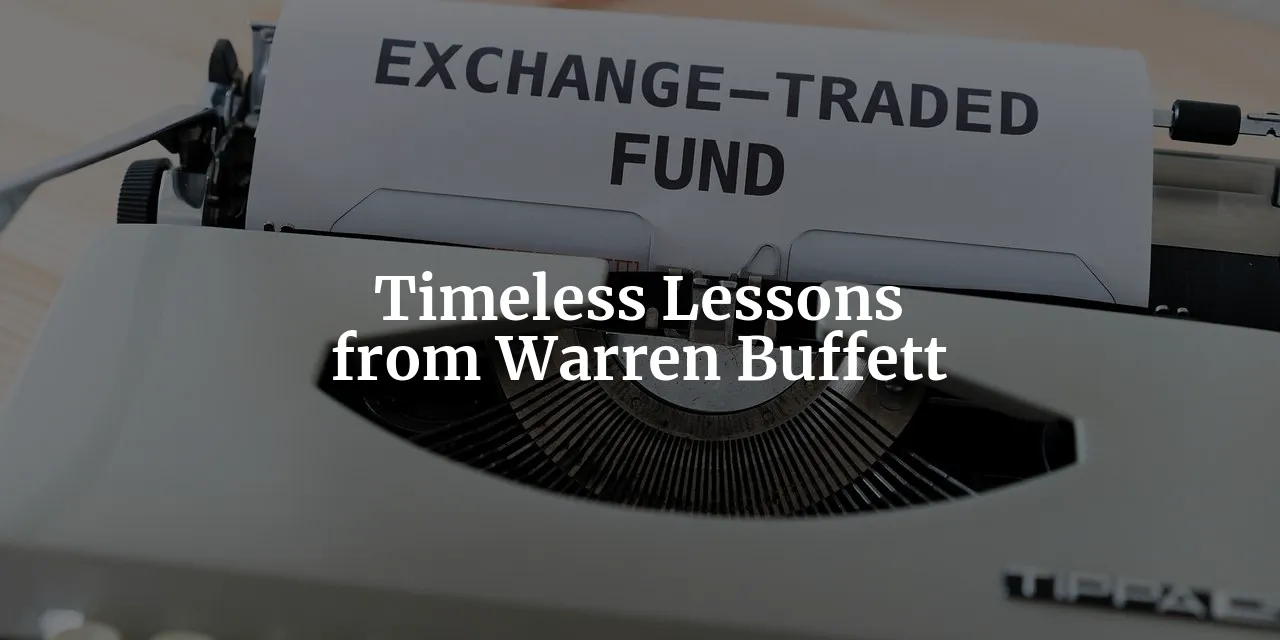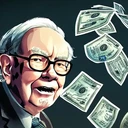Tags: Annual Letters / History / GEICO / FlightSafety
This fanpage is not officially affiliated with Berkshire Hathaway: Disclaimer
Attention Berkshire Hathaway shareholders! Dive into the wisdom of Warren Buffett's 1996 annual letter and uncover timeless lessons that are as relevant today as they were over two decades ago. Learn about long-term investing, financial transparency, strategic capital allocation, value creation, and the power of acquisitions. Discover how these insights can guide your investment approach and decision-making, honoring the legacy of Warren Buffett and ensuring the continued success of Berkshire Hathaway for generations to come. Don't miss out on this treasure trove of wisdom!

Introduction
In the realm of investing, few names command as much respect and attention as Warren Buffett, the Chairman and CEO of Berkshire Hathaway. His annual letters to shareholders are not merely financial summaries but are considered by many as a rich repository of wisdom on investing and management. The year 1996 was another remarkable year for Berkshire Hathaway, with the company's net worth gaining a staggering $6.2 billion, translating to a 36.1% increase. Such a performance is a testament to the enduring principles and strategies that have underpinned Berkshire Hathaway's success over the decades.
The annual letters penned by Buffett are more than just reports; they are educational tools that provide invaluable insights into the mind of arguably the greatest investor of our time. These letters distill complex economic and financial concepts into digestible lessons that can benefit investors of all levels. In this article, we will delve into the 1996 annual letter to shareholders and extract five timeless lessons that remain relevant to Berkshire Hathaway shareholders and the investment community at large.
Through a deep dive into the 1996 letter, we will explore the significance of long-term investing, the importance of transparency and accountability in financial reporting, the intricacies of strategic capital allocation and share issuance, the role of value creation through investments and non-investment earnings, and the power of strategic acquisitions and effective leadership. Each of these lessons will be examined in light of historical, political, and economic contexts to provide a comprehensive understanding of their impact and relevance.
Lesson 1: The Importance of Long-Term Investing
The impressive net worth gain of Berkshire Hathaway in 1996 is a clear indicator of the company's commitment to long-term growth ↗. Over the past 32 years, the per-share book value of Berkshire Hathaway grew by an astonishing 31.8%, from $19 to $19,011. This growth trajectory is a testament to the power of compound interest and the foresight of a long-term investment strategy.
Warren Buffett has always emphasized the significance of looking beyond the short-term market fluctuations and focusing on the underlying value of businesses. By adopting a long-term horizon, investors can ride out the volatility of the markets and reap the rewards of their patience. This approach requires a deep understanding of the businesses in which one invests and a steadfast belief in their intrinsic value.
The historical context of Buffett's investment philosophy can be traced back to the teachings of his mentor, Benjamin Graham, who advocated for the concept of "value investing." This principle involves identifying undervalued companies with strong fundamentals and holding onto these investments until the market recognizes their true worth. Buffett's success over the decades is a powerful endorsement of this investment philosophy.
Lesson 2: Transparency and Accountability in Financial Reporting
In 1996, Berkshire Hathaway faced the need to restate its 1995 financial statements due to the full acquisition of GEICO, which became a wholly-owned subsidiary. This restatement resulted in a writedown of $478.4 million, reducing the company's book value. While such a writedown could be seen as a setback, it also highlighted the company's commitment to transparent financial reporting.
Transparency and accountability are the cornerstones of trust between a company and its shareholders. Buffett's willingness to openly address and rectify financial reporting issues instills confidence in the investment community. It demonstrates that the management's primary concern is to provide shareholders with a clear and accurate picture of the company's financial health.
This lesson is especially relevant in light of historical events such as the Enron scandal, which underscored the catastrophic consequences of deceptive financial practices. Buffett's adherence to ethical financial reporting serves as a bulwark against such malpractices and ensures that Berkshire Hathaway's shareholders are well-informed about the true state of their investment.
Lesson 3: Strategic Capital Allocation and Share Issuance
In 1996, Berkshire Hathaway made the strategic decision to issue shares at a premium to book value not once, but twice ↗. This move was a calculated effort to raise capital without diluting the value for existing shareholders. Buffett's approach to share issuance is a masterclass in strategic capital allocation, ensuring that any new shares benefit the company and its long-term shareholders.
Capital allocation is a critical responsibility for any company's management, and Buffett's acumen in this area is unparalleled. By issuing shares at a premium, Berkshire Hathaway was able to raise funds for further investments and acquisitions without compromising the interests of current shareholders. This approach reflects a deep understanding of market dynamics and a commitment to shareholder value.
The decision to issue shares is often a contentious one, as it can lead to dilution of ownership and earnings per share. However, Buffett's strategy demonstrates that when done judiciously and at the right price, share issuance can be a powerful tool for growth and value creation.
Lesson 4: Value Creation through Investments and Non-Investment Earnings
The year 1996 saw Berkshire Hathaway's investments per share increase by 29.0%, while non-investment earnings grew by an impressive 63.2% ↗. This dual engine of growth showcases Buffett's ability to create value through a diversified portfolio of investments and a robust stream of earnings from the company's operating businesses.
Buffett's investment strategy is not limited to passive stock holdings; it encompasses a broad range of assets, including wholly-owned subsidiaries, stocks, bonds, and real estate. This diversification allows Berkshire Hathaway to tap into various sources of income and capital gains, mitigating risk and maximizing returns.
The growth in non-investment earnings is particularly noteworthy, as it reflects the operational efficiency and profitability of Berkshire Hathaway's subsidiaries. Buffett's hands-off management style empowers the leaders of these businesses to operate autonomously, fostering an environment of entrepreneurial spirit and accountability.
Lesson 5: The Power of Acquisitions and the Importance of Leadership
The strategic acquisitions of Kansas Bankers Surety for $75 million and FlightSafety International for about $1.5 billion in 1996 are prime examples of Berkshire Hathaway's growth through acquisition. These purchases were carefully selected to align with the company's long-term objectives and core competencies.
FlightSafety International, with its 41 locations and 175 simulators, represented a significant addition to Berkshire's portfolio. The acquisition was structured in a way that allowed shareholders of FlightSafety to exchange their shares for cash, Berkshire A, or Berkshire B shares, demonstrating Buffett's flexibility and consideration for the preferences of the acquired company's investors.
Moreover, Buffett's praise for the performance of Berkshire managers who are past 70 highlights the importance of leadership and experience in the company's success. Age is not seen as a barrier but rather as an asset, with seasoned managers bringing a wealth of knowledge and stability to the company's operations.
Conclusion: Timeless Wisdom for Berkshire Hathaway Shareholders
The 1996 annual letter to Berkshire Hathaway shareholders is a treasure trove of wisdom that continues to resonate with investors today. The lessons on long-term investing, financial transparency, strategic capital allocation, value creation, and the power of acquisitions are as relevant now as they were over two decades ago. Buffett's insights provide a guiding light for shareholders looking to navigate the complexities of the investment landscape.
As we reflect on the key lessons from the 1996 letter, it is clear that the principles of Warren Buffett are not merely strategies for financial success but are also philosophies for life. They teach us the virtues of patience, integrity, prudence, and respect for experience. For shareholders of Berkshire Hathaway, these lessons are a blueprint for sustained success and a reminder of the enduring value of their investment.
We encourage all shareholders to revisit these timeless lessons and incorporate them into their investment approach and decision-making. By doing so, they can honor the legacy of Warren Buffett and ensure that the spirit of Berkshire Hathaway continues to thrive for generations to come.
References
- www.berkshirehathaway.com: Chairman's Letter 1996
- finance.yahoo.com: Berkshire Hathaway Inc. (BRK-B) Stock Price, News, Quote & History - Yahoo Finance












